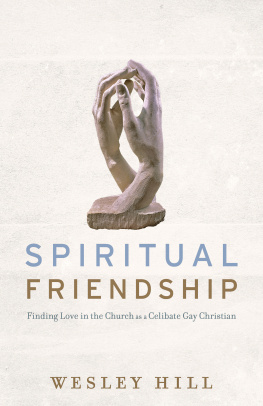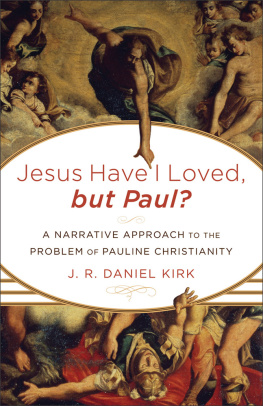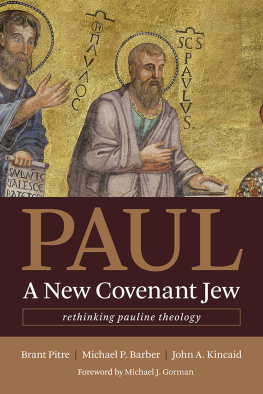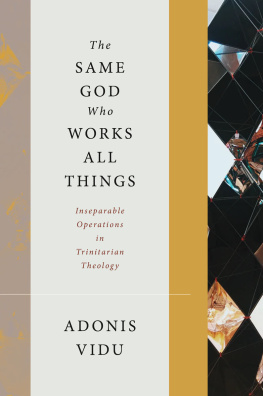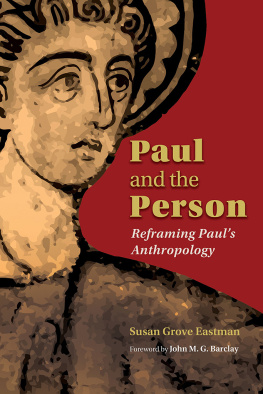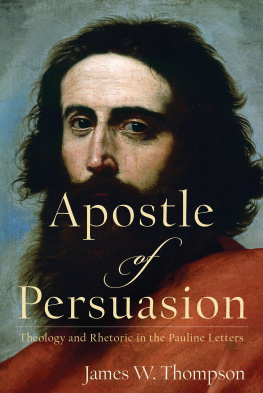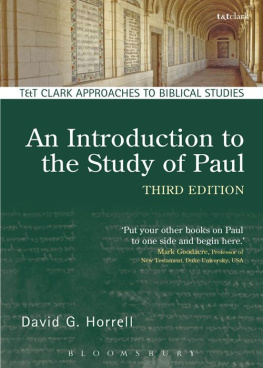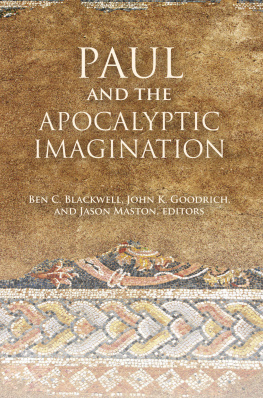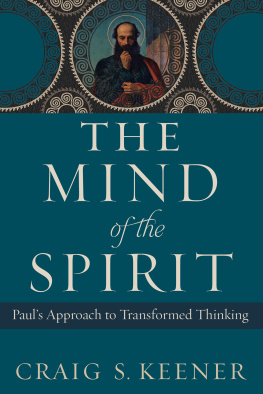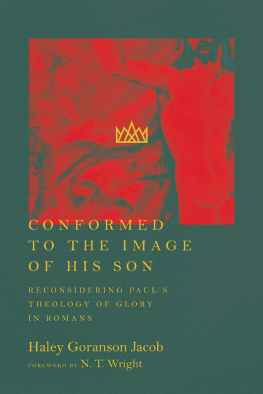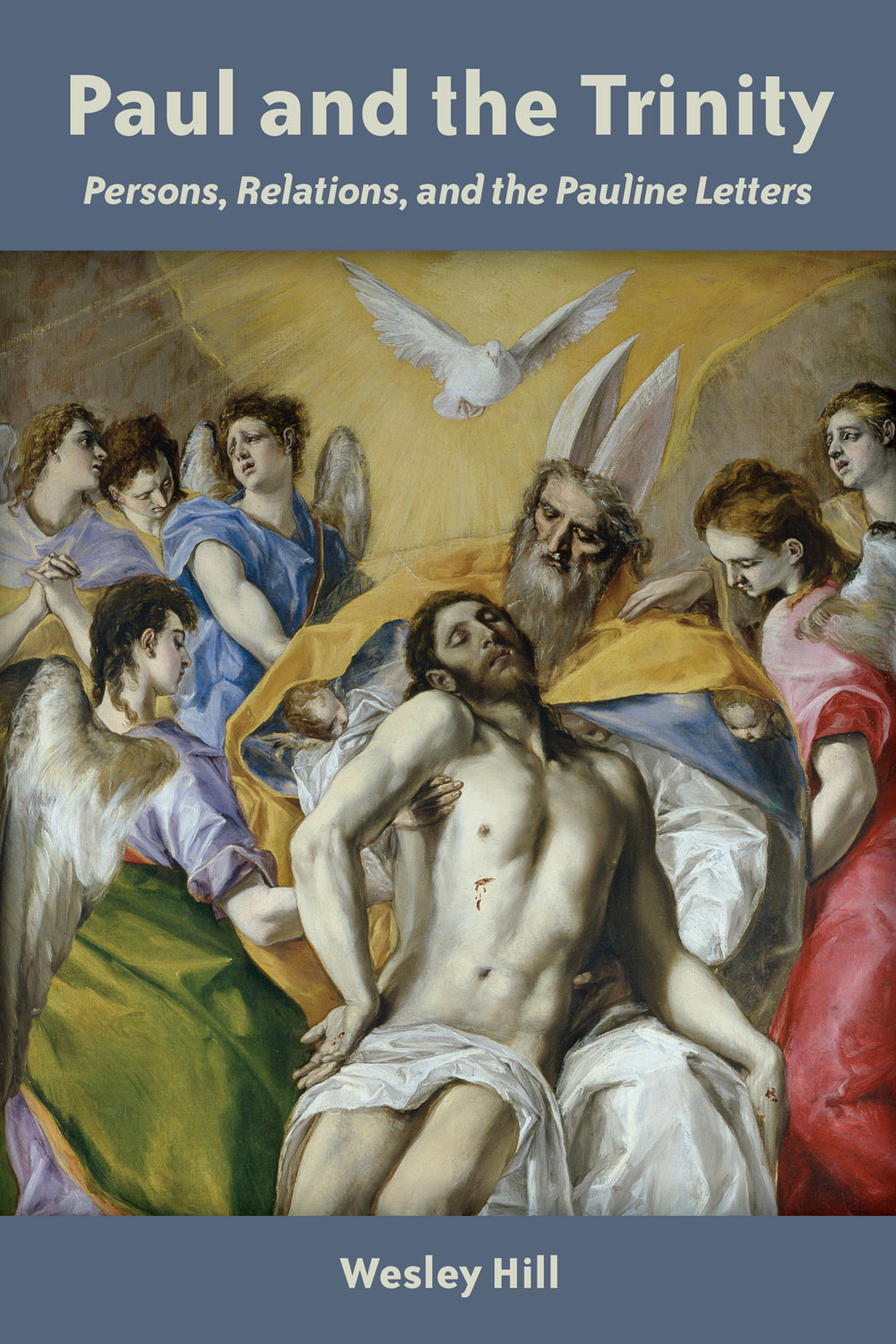Wesley Hill provides an intriguing argument for fundamentally reframing the questions we ask about Pauline christology and trinitarian theology. Given the exegetical care and theological consciousness on display in this well-written book, Hills case deserves serious consideration. Along the way, the book models promising interaction between Scripture and Christian doctrine.
Daniel J. Treier
Wheaton College
In this crisply argued volume Hill demonstrates that theology and the reading of Scripture do not just belong together but need one another. Trinitarian theology, Hill convincingly shows, can provide hermeneutical resources for unlocking how Paul speaks of God the Father, the Son, and the Spirit.... This is theological exegesis at its finest and sharpest.
Angus Paddison
University of Winchester
Advocates with clarity and power for a dense trinitarian reading of Paul. Hill reveals Pauls own subtle use of trinitarian categories, and he shows us how to draw on the trinitarian faith of the church to draw out the beauty and depth of Pauls vision.
Lewis Ayres
Durham University
Paul and the Trinity
Persons, Relations,
and the Pauline Letters
Wesley Hill
William B. Eerdmans Publishing Company
Grand Rapids, Michigan / Cambridge, U.K.
2015 Wesley Hill
All rights reserved
Published 2015 by
Wm. B. Eerdmans Publishing Co.
2140 Oak Industrial Drive N.E., Grand Rapids, Michigan 49505 /
P.O. Box 163, Cambridge CB3 9PU U.K.
Printed in the United States of America
Library of Congress Cataloging-in-Publication Data
Hill, Wesley, 1981
Paul and the Trinity: persons, relations, and the Pauline letters / Wesley Hill.
pages cm
Includes bibliographical references.
ISBN 978-0-8028-6964-7 (pbk.: alk. paper)
eISBN 978-1-4674-4302-9 (ePub)
eISBN 978-1-4674-4262-6 (Kindle)
1. Bible. Epistles of Paul Criticism, interpretation, etc.
2. Trinity Biblical teaching. I. Title.
BS2655.T75H55 2015
227.06 dc23
2014032506
www.eerdmans.com
For my parents,
Walter and Suzanne Hill
Contents
One: The Eclipse of Relations in the Interpretation
of Pauline God-Talk
3. Contemporary Trinitarian Theologies as a Resource
for Pauline Interpretation: Persons and Relations
2. Texts in Which God Is Identified
by Actions Done by/to/in Jesus
3. Rereading Pauline God-Language
in Light of Trinitarian Theologies
2. Elements of Oneness and Subordination
between God and Jesus in Philippians 2:6-11
Four: Jesus in Relation to God:
1 Corinthians 8:6 and 15:24-28
1. The Theologically- and Christologically-Determined
Identity of the Spirit
Acknowledgements
This study grew initially from conversations with John Barclay about the character of Pauls God-discourse. To those early talks, when I was beginning work on my M.A. dissertation at Durham University and attending Professor Barclays Paul and His Interpreters module in the Michaelmas term of 2007, I owe the first stimulus for this project. (Among the most helpful pieces of advice I received from Professor Barclay was, Go have a look at Barths Epistle to the Romans . That was the start of it all.)
When it became clear that the project would attempt a serious engagement with trinitarian theologies, Professor Francis Watson stepped into the role of primary supervisor, and Professor Lewis Ayres, with his expertise in the fourth-century trinitarian controversies, became my secondary supervisor. I am deeply grateful to both of them for guiding the thesis in ways that ensured it would remain a close reading of Paul as well as an engagement with the Sache of Pauls texts; I could not have asked for better supervisors. I would also like to thank Professor Walter Moberly for many helpful informal conversations about the thesis. I would also like to thank my examiners, Angus Paddison and Mark McIntosh, for their critical engagement with the finished product and for helping me make some corrections and improvements.
My interest in Paul began as an undergraduate at Wheaton College (IL), and I would like to thank especially Dr. Scott Hafemann for his direction and encouragement as I learned Greek and began to study Paul in a serious way for the first time. A fellow student from undergraduate days, Dr. Michael Allen, has remained a uniquely encouraging friend and took time to give chapters 2-4 a careful read in the midst of his own busy schedule of teaching and research. This book could not have been written without Mike and his wife Emilys loyal, persistent encouragement, not to mention Mikes keen bibliographic instincts (where would this study have gone without his recommendation that I read Matthew Levering and Gilles Emery?). Another fellow student, this one also at Durham, Dr. Jonathan Linebaugh, read the entirety of the manuscript at least once and discussed its structure and content in detail with me at every stage. I am hugely in Jonos debt, not only for that academic assistance but also for the warm hospitality and friendship he and his family extended to me while I was in Durham. Jono and his wife Megans daughter Callie Jane became my goddaughter the second year of my Ph.D. studies, and it was one of the bright spots of my time in the UK, to say the least.
Other fellow Durham postgraduates, especially Orrey McFarland, discussed my thesis with me in depth at virtually every turn and helped me maintain energy and good humor throughout the writing process. I am more thankful than I can say for Orrey and his wife Kristis friendship (which began almost literally from Day One in Durham and has remained a great gift), as well as the kindness of our whole circle Jon and Amelia Parker and family, Todd and Kelly Brewer, Paul and Katy Jones, Matt and Brandy Crawford, Dave and Mindy Briones, Ben and Martha Dunson, Ben and Heather Blackwell, and the whole gang at 37a N. Bailey and the other members of the New Testament Seminar.
I am grateful to Durham University for awarding me a Doctoral Fellowship which made this research possible.
I am also grateful to the members of my church in Durham, The Kings Church, who opened their homes and hearts to me. Particular mention must go to Mark and Ruth Bonnington (and Ana, Gus, and Zak), Ruth Perrin, and not least my worship leader, next-door neighbor, theological conversation partner, and dear friend Chris Juby, his wife Hannah, and their son my godson Samuel Thomas. The Jubies found me a place to live before I even arrived and supported me in countless ways during our happy years together as fellow Neville Terrace dwellers.
Finally, I want to thank my family who, in the early years of my childhood, helped nurture in me a love for Scripture that, I believe, led directly to this thesis. My sister Laurie and my brother Lance have been unflagging in their commitment to me, as have my brother-in-law Justin and my new nephew Christian Michael. But above all, I am grateful to my parents, Walter and Suzanne Hill, for their love. I often say to people that my earliest childhood memories are of hearing my parents read stories from the Bible to me, including the Arch Book pictorial, rhyming version of Sauls encounter with the risen Lord on the road to Damascus. From those early days of reading Paul until my current, more sophisticated (though not necessarily wiser) reading, Dad and Mom have been my most important mentors, cheerleaders, and now friends. It is to them that I dedicate this thesis, with love.
Wesley A. Hill
Abbreviations
ABAnchor Bible
Ablab. Gregory of Nyssa, Ad Ablabium
Adv. Eu. Basil of Caesarea, Adversus Eunomium; Gregory of Nyssa, Adversus Eunomium


